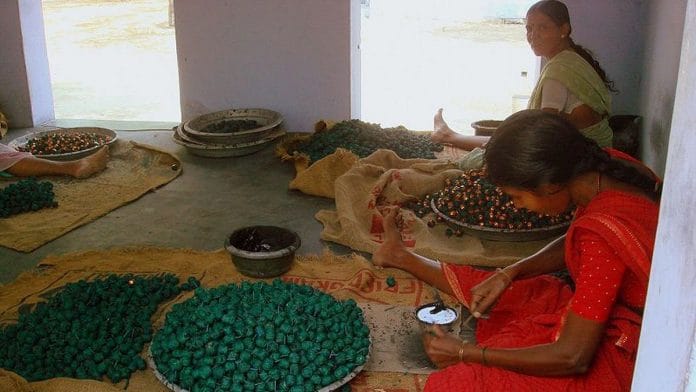The toxic chemicals whose manufacturing brought the environmental spotlight on Tamil Nadu’s Sivakasi may just help transform the city’s fortunes after all — with some help from the IIT Madras, the Indian Space Research Organisation and the Tamil Nadu government.
Both the ISRO and the Ministry of Defence (MoD) will need huge quantities of propellants and explosives soon — the ISRO for the launch of its satellites and the MoD as part of its efforts to indigenise ammunition production.
And Tamil Nadu’s Sivakasi, whose thriving firecracker economy is reeling under shut factories and lakhs of workers without jobs, has what one would call the “nature’s gift”.
Sivakasi has a dry climate and low rainfall all year round, making it ideal for the manufacturing of explosives. This explains the offset printing industry in Sivakasi, with its more than 800 factories producing 90 per cent of India’s fireworks, 80 per cent of all safety matches, and providing the country 60 per cent of the offset printing services.
Also read: How IIT Madras’ Make in India defence model is a blueprint for success
Sivaksi is also very cost competitive since its dryness minimises air-conditioning requirements. Over the past century, the Pyro Town has developed expertise in handling raw material used in explosives and adopted technologies that are relevant to firecrackers. Significantly, its expertise in making aluminium metal powders — a vital ingredient for explosives and the forte of Sivakasi — has been enhanced with the latest technology from IIT Madras, with some fireworks units having already started supplying material for defence purposes. Industrial units in Tamil Nadu also manufacture other major ingredients for propellant and explosives – ammonium perchlorate and Hydroxyl-terminated polybutadiene (binding agent).
The IIT Madras is taking the lead in trying to completely transform Sivakasi from a firecracker hub to an explosives and propellant industrial base. The institute’s faculties started by first bringing to the notice of authorities handling the Tamil Nadu Defence Industrial Corridor (TANDICO) the fact that Tamil Nadu does not manufacture composite solid propellants despite having all industry which produces its constituent ingredients.
The IIT Madras is the only educational institute that carries out cutting-edge research in the field of explosives and propellants. It also advises the ISRO, the DRDO, the OFB and a few private players. It will have to establish a dedicated research centre to enhance indigenisation and open export market of explosives.
All this makes the IIT Madras the ideal knowledge partner in this transformational exercise. And the institute’s role will only increase in the near future, with the ISRO going commercial with the launch of international satellites. Indian government’s Department of Space notes that as of August 2018, the ISRO’s Polar Satellite Launch vehicle (PSLV) has successfully launched 239 foreign satellites from 29 countries. There are plans to expand this capacity for international and domestic purposes.
The expected number of launches annually are 20-30 SSLVs (Small Satellite Launch Vehicle), 10 PSLVs and 5 GSLVs (Geo-Synchronous Satellite Launch Vehicle). Each of these launch vehicles will need about 100-120 tons, 220 tons and 425 tons of composite propellant, respectively. Annual future requirement of propellants will be more than the ISRO’s integral capacity. It is looking for private partners to help with the manufacturing of composite propellants, which will cost around Rs 5,000-8,000 per kg. This has been assessed by the IIT Madras.
Also read: What are green crackers & how do we make them, ask Sivakasi’s troubled firework-makers
The scale is huge. If the ISRO must carry out these launches, it will need another launching site eventually. For that it will have to scout for a site further south on the Tamil Nadu coast for two main reasons — the nearer the site is to the equator the better it is for the launch, and the north of Sriharikota is crowded.
Sivakasi’s business fortunes can also take heart in the MoD’s efforts to indigenise ammunition production. Even if its efforts are incrementally successful, the requirement of raw material for propellants and explosives for research purposes by the Defence Research and Development Organisation (DRDO) and the production of service ammunition will be beyond the capacities of Ordnance Factor Board (OFB) and other private players. While the scale of ISRO is huge and immediate, the range of MoD’s requirement is vast. In time, the requirement of the MoD will match that of the ISRO.
This is where the Tamil Nadu government will have to come in. The government will in all probability get involved with the establishment of the new launch site, which will likely be proximal to Sivakasi and help the town derive huge logistic cost benefits.
Also read: The Bengaluru start-up that is building affordable model rockets you can buy
The launch site needs to drive the conversion of Sivakasi into an explosive and propellant manufacturing hub as part of TANDICO. It will involve infrastructural establishment, financial enablement, assistance in licensing and training. The Tamil Nadu government must see beyond and look at international markets for exports as well. it must also start talking to the DRDO and the OFB to explore feasibility of sourcing items from Sivakasi.
All in all, there is a win-win situation emerging in the conversion of Sivakasi to a propellant manufacturing hub. It is a low hanging fruit. If Sivakasi is not transformed, we might have to turn to import. That will be stupid to say the least.
The author is a professor, Aerospace Dept, IIT Madras.







Will any judge who had banned crackers or else those who filed against crackers prove it is the one day deepavali crackers which are polluting ?
The paper work reqd by ISRO and the quality checks are too much,and this cannot be economically viable for a small scale industry.
Looks like a win-win situation provided the Evangelical industry is completely wiped out of T.N.
Wonderful